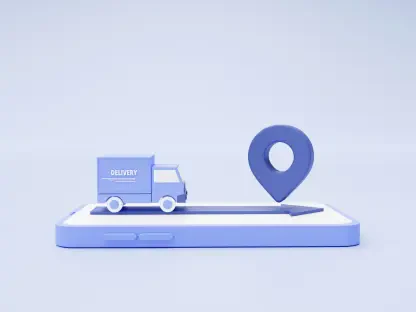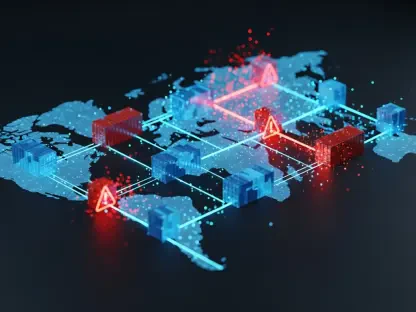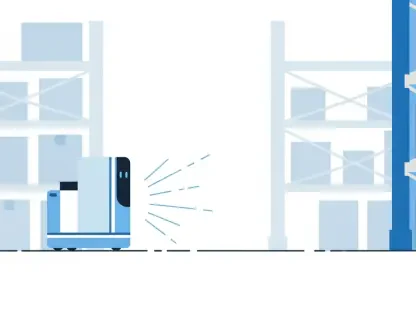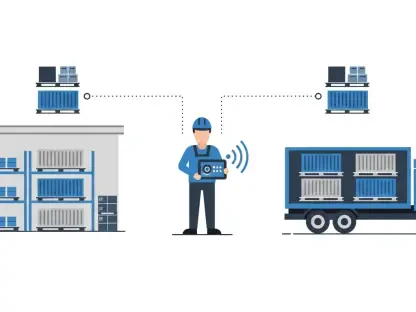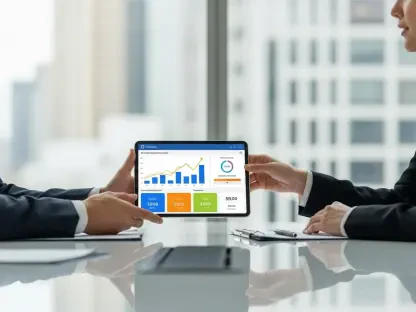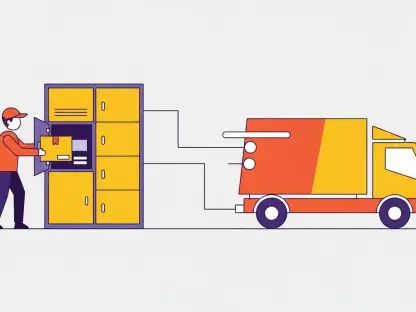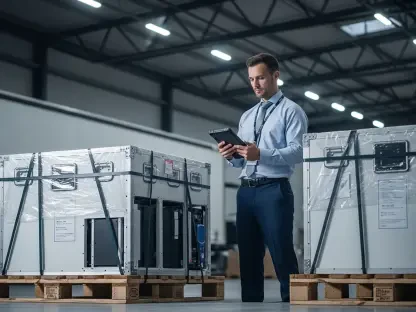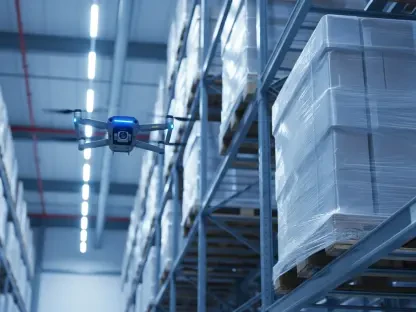Air tracking technology is revolutionizing global logistics by providing real-time data on cargo location, environmental conditions, and transit timelines. This cutting-edge approach is setting new standards for efficiency, security, and customer satisfaction in the industry. The evolution of air tracking technology has come as a crucial response to the growing complexity and demands of the global supply chain, offering real-time insights that were previously unattainable.
Air Tracking in the Global Logistics Ecosystem
Real-Time Monitoring and Control
Air tracking involves using real-time technology to monitor the precise location, movement, and conditions of air freight during transit. Unlike traditional methods, which relied on simple checkpoints at airports and created long intervals of uncertainty, modern air tracking leverages advancements in GPS, IoT, and data analytics to deliver near-constant updates as cargo crosses borders. This technology is invaluable not only to logistics providers but also to manufacturers, retailers, and consumers, offering continuous visibility and control over shipments.
The integration of real-time monitoring facilitates a significant reduction in transit times by streamlining the coordination between various stakeholders. Logistics providers gain the ability to make data-driven decisions, optimizing routes and schedules for better efficiency. Manufacturers benefit by aligning production schedules with precise delivery timelines, thus avoiding overstocking or stockouts. Retailers, especially in the e-commerce sector, can provide their customers with real-time shipment updates, enhancing the overall shopping experience and increasing customer loyalty by ensuring accurate delivery times.
Benefits for Stakeholders
The continuous visibility provided by air tracking minimizes the need for status inquiries, reducing uncertainty and building confidence in the delivery process. For logistics providers, this means fewer disruptions and more efficient operations. This enhanced operational visibility allows for better planning and quicker response times to any unforeseen delays or issues during transit. Consequently, logistics providers can maintain high service levels and reduce the incidence of delayed deliveries, ultimately leading to cost savings and improved customer satisfaction.
Manufacturers and retailers benefit from reduced idle time at airports and optimized warehouse management. The transparency provided by real-time tracking enables them to prepare for inbound goods effectively, thus reducing bottlenecks and improving overall supply chain efficiency. Consumers, on the other hand, enjoy accurate delivery times and improved trust in the delivery process. The reliability and transparency afforded by air tracking foster a sense of confidence among customers, leading to higher levels of satisfaction and repeat business. This holistic improvement across the supply chain underscores the far-reaching benefits of air tracking technology.
Technological Advancements Driving Air Tracking
Internet of Things (IoT)
IoT devices like GPS sensors and environmental monitors are installed within cargo holds. These devices continuously collect and transmit data on cargo location, temperature, humidity, and even shock or vibration, thereby enabling comprehensive monitoring. This real-time data collection is crucial for ensuring the safe transport of delicate goods and maintaining the integrity of shipments. The advent of IoT has revolutionized the way logistics operations are conducted, providing unparalleled visibility and control over the movement and condition of goods in transit.
The capabilities offered by IoT technology extend beyond simple location tracking. For instance, temperature and humidity sensors ensure that perishable goods such as food and pharmaceuticals are maintained within specific environmental parameters throughout their journey. Similarly, shock and vibration sensors protect high-value or delicate items from damage during transit. By addressing these critical aspects, IoT-based air tracking safeguards the quality and integrity of the cargo, mitigating risks and ensuring compliance with stringent regulatory standards.
Blockchain for Data Security
Blockchain technology is being increasingly utilized to record air tracking data. It provides transparency and tamper-proof verification, crucial for industries handling high-value or sensitive items, such as pharmaceuticals, where data integrity impacts regulatory compliance. Blockchain ensures that all parties involved in the supply chain have access to a secure and immutable record of the cargo’s journey. This decentralized ledger system eliminates the possibility of data manipulation, ensuring the authenticity and reliability of tracking information.
The security features of blockchain are particularly valuable in sectors that require stringent traceability and accountability. For example, in the pharmaceutical industry, regulatory bodies mandate rigorous documentation of the supply chain to ensure the safety and efficacy of medical products. Blockchain provides an immutable record that meets these compliance requirements, enhancing trust among stakeholders. Furthermore, the traceability offered by blockchain aids in swiftly identifying and addressing any issues or discrepancies, expediting the resolution process and maintaining the integrity of the supply chain.
Machine Learning and Predictive Analytics
Machine learning algorithms analyze historical data to estimate arrival times, suggest optimal routes, and detect delay patterns. Predictive analytics allows for anticipation of disruptions and implementation of contingency plans, greatly minimizing delays and risks. This proactive approach to logistics management enhances overall efficiency and reliability. By leveraging machine learning and predictive analytics, logistics providers can transform raw data into actionable insights, driving more informed decision-making and improving operational performance.
The integration of machine learning into logistics operations facilitates dynamic route optimization, enabling logistics providers to adapt to real-time conditions such as traffic, weather, and other unforeseen events. This adaptability ensures that goods are transported via the most efficient routes, reducing transit times and costs. Predictive analytics also play a crucial role in demand forecasting, helping businesses anticipate fluctuations and align their supply chain strategies accordingly. By adopting these advanced technologies, logistics providers can offer more reliable and efficient services, meeting the increasing expectations of modern supply chains.
Key Benefits of Air Tracking in Global Logistics
Enhanced Visibility and Transparency
Continuous cargo tracking from origin to destination minimizes the need for status inquiries, reducing uncertainty and building confidence in the delivery process. This transparency is particularly beneficial for industries that require precise delivery timelines, such as e-commerce and pharmaceuticals. The ability to monitor shipments in real time allows businesses to provide accurate and up-to-date information to their customers, enhancing trust and satisfaction.
The enhanced visibility provided by air tracking technology also enables businesses to quickly identify and respond to any disruptions or delays. This proactive approach ensures that any issues are addressed promptly, minimizing the impact on the overall supply chain. By reducing uncertainty and providing a clear picture of the shipment’s status, air tracking fosters a more efficient and reliable logistics process, ultimately leading to higher customer satisfaction and improved business performance.
Improved Operational Efficiency
Real-time tracking data streamlines operations by reducing idle time at airports, optimizing warehouse management, and minimizing manual labor associated with shipment status updates. This results in faster transit times and lower operational costs, making the logistics process more efficient and cost-effective. With accurate and timely information at their fingertips, logistics providers can make better-informed decisions, resulting in smoother and more efficient operations.
For example, real-time tracking data allows logistics providers to plan and allocate resources more effectively, reducing the time spent waiting for shipments and ensuring that goods move seamlessly through the supply chain. Additionally, accurate tracking information minimizes the need for manual status updates, freeing up valuable labor resources for other tasks. These improvements in operational efficiency translate into cost savings and a more competitive edge for businesses in the global logistics market.
Higher Customer Satisfaction
Accurate delivery times provided through real-time tracking improve customer trust and satisfaction. E-commerce companies, in particular, benefit from offering end-to-end visibility, creating a seamless shopping experience for their customers. This enhanced customer experience can lead to increased loyalty and repeat business. By providing customers with precise and reliable delivery information, businesses can meet and exceed their expectations, fostering long-term relationships and driving growth.
Moreover, the transparency afforded by air tracking technology allows customers to stay informed about their shipments at all times, reducing anxiety and uncertainty. This level of visibility not only enhances the overall customer experience but also builds trust and confidence in the delivery process. In an increasingly competitive market, businesses that leverage air tracking technology to improve customer satisfaction will be better positioned to retain and attract new customers.
Risk Mitigation
Monitoring environmental conditions like temperature, humidity, and exposure to shock ensures the safe transport of delicate goods. This is crucial for perishable items, electronics, and pharmaceuticals to prevent spoilage or damage. Real-time alerts allow for prompt intervention, reducing the risk of product loss and ensuring compliance with regulatory standards. By leveraging air tracking technology, businesses can proactively address potential risks and maintain the integrity of their shipments.
For instance, IoT-based sensors can detect any deviations from the prescribed environmental parameters, triggering immediate alerts to relevant stakeholders. This enables quick corrective actions, such as adjusting storage conditions or rerouting the shipment, to mitigate any adverse effects. By ensuring safe and secure transportation, air tracking technology helps businesses protect their valuable and sensitive goods, minimizing losses and ensuring customer satisfaction.
Industry-Specific Applications of Air Tracking
Pharmaceuticals
Ensuring the safe transport of temperature-sensitive drugs and vaccines is paramount. Real-time environmental monitoring helps prevent spoilage and ensures compliance with regulatory standards, critical for global vaccine distribution. This level of control is essential for maintaining the efficacy of pharmaceutical products. The pharmaceutical industry heavily relies on precise environmental conditions to preserve the quality and effectiveness of medications.
Incorporating air tracking technology into pharmaceutical logistics enables real-time monitoring of temperature, humidity, and other critical factors throughout the transportation process. This ensures that drugs and vaccines remain within the required temperature ranges, preventing spoilage and maintaining their potency. Additionally, the ability to provide an immutable record of the shipment’s journey through blockchain technology enhances transparency and compliance with regulatory requirements, further safeguarding the integrity of pharmaceutical products.
Electronics
High-value, fragile electronics are vulnerable to shock and vibration. Air tracking allows for monitoring and protecting these items from damage during transit. By providing real-time data on the conditions of the cargo, logistics providers can take immediate action to mitigate any potential risks. This level of oversight helps ensure that electronic goods arrive at their destination in optimal condition, maintaining their value and functionality.
The use of IoT sensors in electronics logistics enables the detection of any excessive shocks or vibrations experienced by the cargo during transit. If such conditions are detected, alerts can be sent to logistics providers, allowing them to take appropriate measures, such as adjusting packaging or rerouting the shipment, to prevent damage. This proactive approach to risk management helps protect high-value electronic goods, minimizing losses and ensuring customer satisfaction.
Perishables
Food, flowers, and other perishables require strict temperature and humidity control. IoT-based air tracking provides alerts when environmental parameters are exceeded, allowing prompt intervention to avoid spoilage. This ensures that perishable goods arrive in optimal condition, maintaining their quality and value. The perishables industry faces unique challenges due to the shelf life and quality requirements of its products, making real-time environmental monitoring crucial for success.
By leveraging air tracking technology, businesses in the perishables industry can maintain the required conditions throughout the entire transportation process. This reduces the risk of spoilage and waste, ensuring that goods retain their freshness and quality upon arrival. The ability to provide real-time updates and alerts also enhances transparency and accountability in the supply chain, fostering trust among stakeholders and improving overall operational efficiency.
Luxury Goods
Transporting high-value items like jewelry and designer clothing demands added security. Air tracking monitors location and maintains a secure chain of custody from origin to delivery. This level of security is crucial for protecting valuable goods and ensuring they reach their destination safely. The luxury goods industry requires heightened measures to safeguard products due to their high value and susceptibility to theft or damage.
Air tracking technology provides end-to-end visibility and control over the transportation of luxury goods, ensuring that every step of the journey is monitored and documented. By maintaining a secure chain of custody, businesses can mitigate risks and prevent unauthorized access to valuable items. This level of security not only protects the goods but also enhances the brand reputation and trust among customers, who can be assured that their high-value purchases will arrive safely and intact.
Challenges in Implementing Air Tracking Technology
Data Management and Integration
The extensive data generated by IoT devices can be overwhelming to manage and interpret. Integrating this data into existing systems and leveraging it for actionable insights requires robust infrastructure and data strategies. Companies must invest in advanced data management solutions to fully benefit from air tracking technology. Effective data management is crucial for transforming raw data into meaningful insights that can drive decision-making and improve operational efficiency.
One of the key challenges in implementing air tracking technology is ensuring interoperability between different systems and platforms. Companies need to develop strategies for seamless data integration, allowing for a holistic view of the supply chain. Additionally, businesses must invest in advanced analytics tools capable of processing and interpreting the vast amounts of data generated by IoT devices. By addressing these challenges, companies can unlock the full potential of air tracking technology, turning data into a valuable asset that enhances the entire logistics process.
Privacy and Compliance Issues
Air tracking technology is revolutionizing global logistics by delivering real-time information on cargo location, environmental conditions, and transit timelines. This advanced technology is raising the bar for efficiency, security, and customer satisfaction in the logistics industry. By offering real-time insights that were once unattainable, air tracking technology meets the increasing demands and complexities of the global supply chain.
The significance of air tracking technology lies in its ability to provide accurate, up-to-the-minute data. This precision allows logistics companies to monitor shipments with unparalleled accuracy, ensuring that goods are handled correctly and arrive on time. Furthermore, the detailed environmental data helps protect sensitive cargo from conditions that could degrade its quality.
As a result, businesses can optimize their supply chain workflows, reduce losses due to spoilage or damage, and improve overall operational efficiency. This innovative approach not only enhances security measures but also boosts customer confidence and satisfaction, setting new standards in the industry.


